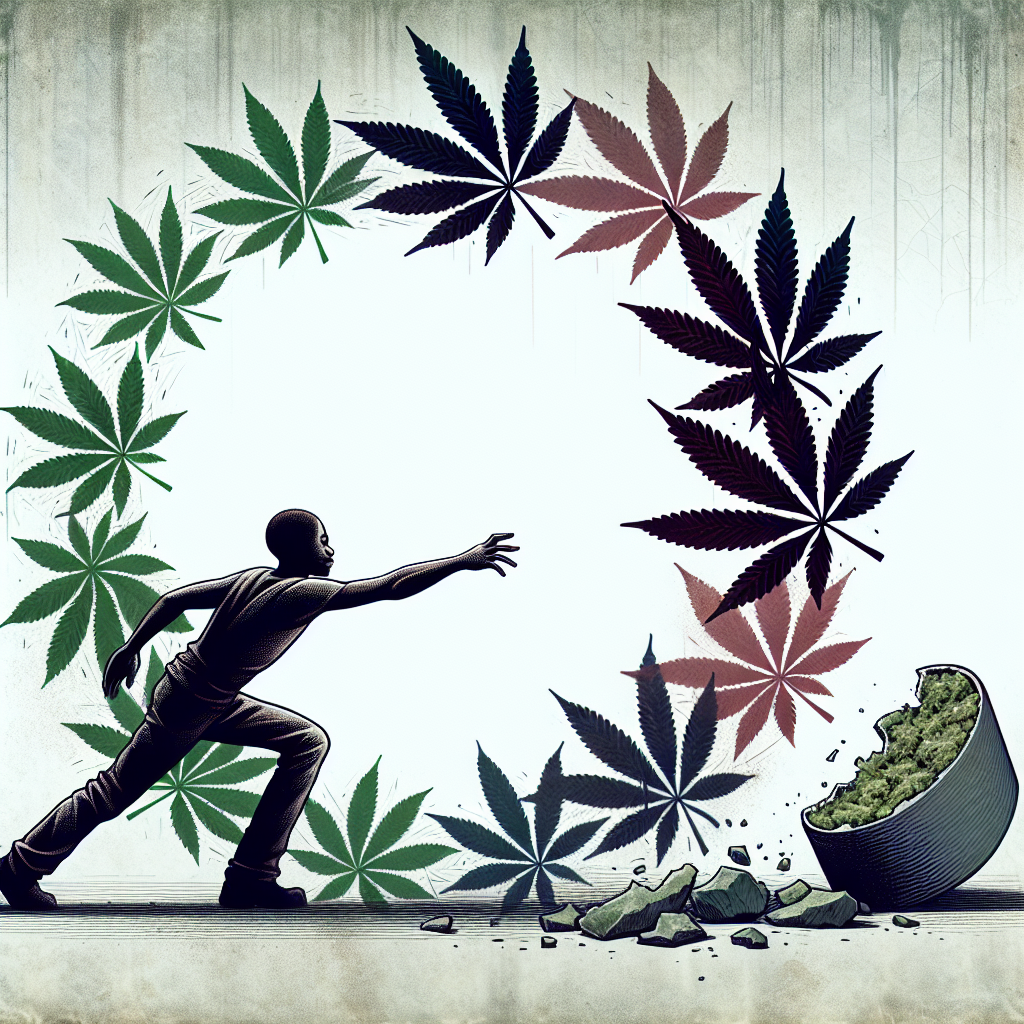-
Table of Contents

“Marijuana Dependence: Breaking the Cycle – Empowering Change, Embracing Freedom.”
Introduction
Marijuana dependence, often referred to as cannabis use disorder, is a condition characterized by the compulsive use of marijuana despite significant negative consequences. This dependence can lead to a range of physical, psychological, and social issues, impacting an individual’s overall well-being and quality of life. Breaking the cycle of marijuana dependence involves understanding the underlying causes, recognizing the signs and symptoms, and implementing effective strategies for treatment and recovery. This introduction aims to shed light on the complexities of marijuana dependence and the pathways to overcoming it, emphasizing the importance of support, education, and comprehensive care in achieving lasting change.
Strategies for Overcoming Marijuana Dependence: Breaking the Cycle
Overcoming marijuana dependence is a journey that requires determination, support, and effective strategies. Breaking the cycle of dependence can be challenging, but with the right approach, it is entirely possible. The first step in this process is acknowledging the problem. Recognizing that marijuana use has become a dependency rather than a casual habit is crucial. This self-awareness sets the stage for meaningful change and opens the door to seeking help.
One of the most effective strategies for overcoming marijuana dependence is setting clear, achievable goals. These goals should be specific, measurable, and time-bound. For instance, instead of vaguely deciding to “cut back,” one might set a goal to reduce usage by a certain amount each week. This approach not only provides a clear roadmap but also allows for tracking progress, which can be incredibly motivating.
In addition to goal-setting, building a strong support network is essential. This network can include friends, family, and support groups who understand the challenges of marijuana dependence. Sharing your goals and progress with these individuals can provide accountability and encouragement. Moreover, connecting with others who have successfully overcome similar challenges can offer valuable insights and inspiration.
Another critical strategy is developing healthy coping mechanisms. Many individuals turn to marijuana as a way to manage stress, anxiety, or other emotional difficulties. Identifying alternative ways to cope with these feelings is vital. Exercise, meditation, and engaging in hobbies are all excellent ways to manage stress without relying on marijuana. Additionally, seeking professional help from a therapist or counselor can provide tools and techniques for dealing with underlying issues that may contribute to dependence.
Creating a structured routine can also play a significant role in breaking the cycle of marijuana dependence. Having a daily schedule that includes time for work, exercise, social activities, and relaxation can reduce the likelihood of turning to marijuana out of boredom or habit. Structure provides a sense of purpose and can help fill the void left by reducing or eliminating marijuana use.
Furthermore, it is important to be mindful of triggers that may lead to marijuana use. These triggers can be people, places, or situations that are associated with past use. Identifying and avoiding these triggers, especially in the early stages of recovery, can prevent relapse. If avoidance is not possible, developing strategies to cope with these triggers can be beneficial. For example, if social situations are a trigger, having a plan in place to handle peer pressure can make a significant difference.
Education is another powerful tool in overcoming marijuana dependence. Understanding the effects of marijuana on the brain and body can reinforce the decision to quit. Knowledge about the potential long-term consequences of continued use can serve as a strong motivator to stay on the path to recovery.
Lastly, celebrating small victories along the way is crucial. Each step forward, no matter how small, is a testament to your strength and commitment. Acknowledging and rewarding yourself for these achievements can boost morale and reinforce positive behavior.
In conclusion, breaking the cycle of marijuana dependence is a multifaceted process that involves self-awareness, goal-setting, support, healthy coping mechanisms, structured routines, trigger management, education, and celebrating progress. While the journey may be challenging, it is also an opportunity for personal growth and transformation. With determination and the right strategies, overcoming marijuana dependence is not only possible but also a path to a healthier, more fulfilling life.
The Psychological Impact of Marijuana Dependence and How to Break Free
Marijuana dependence can have profound psychological impacts, often creating a cycle that feels difficult to break. Understanding these effects is crucial for those seeking to regain control over their lives. The psychological impact of marijuana dependence can manifest in various ways, including anxiety, depression, and a diminished ability to experience pleasure from everyday activities. These symptoms can create a feedback loop, where individuals use marijuana to alleviate their distress, only to find that their reliance on the substance exacerbates their mental health issues over time.
One of the most insidious aspects of marijuana dependence is its subtlety. Unlike some other substances, marijuana’s effects can be less immediately disruptive, leading many to underestimate its potential for dependence. However, over time, the brain’s reward system can become increasingly reliant on the drug to produce feelings of well-being. This can result in a decreased ability to find joy in activities that were once fulfilling, such as hobbies, social interactions, and even professional achievements. Consequently, individuals may find themselves caught in a cycle of using marijuana to escape feelings of emptiness, only to deepen their dependence.
Breaking free from marijuana dependence requires a multifaceted approach, beginning with the recognition of the problem. Acknowledging the psychological impact of dependence is the first step toward recovery. This often involves a period of self-reflection and honesty, where individuals assess how marijuana use has affected their mental health and overall quality of life. Support from friends, family, or a mental health professional can be invaluable during this stage, providing encouragement and perspective.
Once the problem is recognized, setting clear and achievable goals is essential. These goals might include reducing the frequency of use, setting specific times when marijuana is off-limits, or even committing to a period of complete abstinence. It is important to approach these goals with a sense of compassion and patience, understanding that setbacks are a natural part of the recovery process. Celebrating small victories along the way can help maintain motivation and build momentum.
In addition to setting goals, developing healthy coping mechanisms is crucial for breaking the cycle of dependence. Engaging in physical activities, such as exercise or sports, can help reduce stress and improve mood. Mindfulness practices, such as meditation or yoga, can also be effective in managing anxiety and promoting a sense of inner peace. Finding new hobbies or rekindling old ones can provide a sense of purpose and fulfillment, helping to fill the void left by marijuana use.
Building a strong support network is another key component of recovery. Connecting with others who have experienced similar struggles can provide a sense of solidarity and understanding. Support groups, both in-person and online, can offer a safe space to share experiences and gain insights from others who are on the same journey. Professional counseling or therapy can also be beneficial, providing tailored strategies to address the psychological aspects of dependence.
Ultimately, breaking free from marijuana dependence is a journey that requires commitment, resilience, and support. By understanding the psychological impact of dependence and taking proactive steps to address it, individuals can reclaim their mental health and rediscover the joy and fulfillment that life has to offer. The path to recovery may be challenging, but with determination and the right resources, it is entirely possible to break the cycle and build a healthier, more fulfilling future.
Q&A
1. **Question:** What are some common symptoms of marijuana dependence?
**Answer:** Common symptoms of marijuana dependence include cravings for the drug, increased tolerance, withdrawal symptoms such as irritability and sleep disturbances, and continued use despite negative consequences.
2. **Question:** What are some effective strategies for breaking the cycle of marijuana dependence?
**Answer:** Effective strategies for breaking the cycle of marijuana dependence include seeking professional counseling or therapy, participating in support groups, developing healthy coping mechanisms, and possibly using medication-assisted treatment under medical supervision.
Conclusion
Marijuana dependence, characterized by the compulsive use of cannabis despite adverse consequences, poses significant challenges to individuals and society. Breaking the cycle of dependence requires a multifaceted approach, including education, support systems, and access to treatment options such as cognitive-behavioral therapy and motivational enhancement therapy. Early intervention, public awareness, and reducing stigma are crucial in promoting recovery and preventing relapse. By addressing the underlying psychological, social, and environmental factors, individuals can achieve long-term sobriety and improve their overall well-being.



